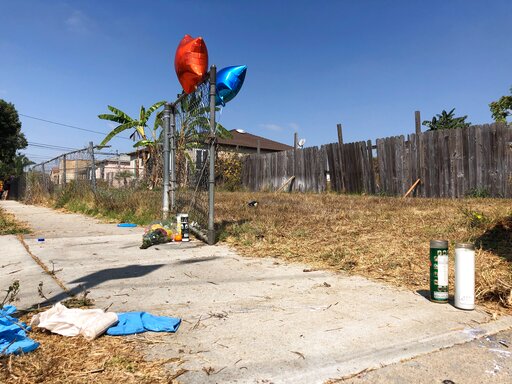LOS ANGELES (AP) — A Black man was shot and killed by Los Angeles County sheriff’s deputies after he was stopped for a traffic violation while riding a bike, then ran from police, punched one officer and dropped a bundle that included a gun, authorities said.
The Monday afternoon shooting death of Dijon Kizzee in South Los Angeles prompted a peaceful protest hours later and Black Lives Matter began marching Tuesday evening from the scene to a sheriff’s precinct station.
The killing came on the heels of the police shooting in Kenosha, Wisconsin, that left Jacob Blake, who is also Black, paralyzed and spurred days of protests, reinvigorating the national debate on racial injustice and policing.
Also Tuesday, the Los Angeles County Board of Supervisors voted to ask the coroner to conduct an inquest into the fatal deputy shooting of 18-year-old Andres Guardado on June 18. Guardado was shot five times in the back after deputies said they saw him with a gun and he ran. Guardado’s family filed a wrongful death lawsuit on Monday against the county, the Sheriff’s Department and deputies involved in the shooting.
Kizzee’s family and friends created a small memorial for him at the shooting scene in the Westmont neighborhood — leaving flowers, balloons and candles just feet away from first responders’ discarded blue medical gloves and rolled bandages.
The Sheriff’s Department has not released Kizzee’s name, but two relatives confirmed his identity. In interviews with The Associated Press, they remembered the 29-year-old Kizzee as an energetic man with many friends and expressed anger at the shooting.
“You guys take care of dogs, you don’t take care of us,” said Kizzee’s aunt, Fletcher Fair, addressing the Sheriff’s Department. “He was a sweet and loving young man. He had his whole life ahead of him and it was cut short by rogue sheriffs.”
Kizzee’s uncle, Anthony Johnson, 33, said they grew up together and were as close as brothers. Johnson said he often warned his nephew that, as a Black man, he had to be especially careful.
“‘You have a target on your back, just by being you,’” Johnson remembered telling Kizzee as recently as a few weeks ago. “He was like, ‘Yeah, all right, uncle,’ like he always says.”
Sheriff’s Lt. Brandon Dean said Monday that investigators had not yet interviewed the two deputies involved, but he gave this account: When deputies tried to stop Kizzee for riding his bicycle in violation of vehicle codes, he dropped his bike and ran. When they caught up to him he punched one of them in the face and dropped a bundle of clothes he was carrying. The deputies spotted a handgun in the bundle and opened fire.
“He was in possession of a firearm and did assault a deputy,” Dean said.
Dean did not describe the alleged violation that prompted the stop and the Sheriff’s Department did not provide any additional information about the investigation on Tuesday.
Neighborhood resident Arlander Givens, 68, questioned why deputies fired at a man who, according to the sheriff’s official, wasn’t holding a weapon.
“If he reached down to grab it, that’s different,” Givens told the Los Angeles Times. “But if it’s on the ground, why shoot? That means he was unarmed.” Police said the handgun was recovered and no deputies were injured. TV news helicopters showed a gun near the body. Dean said investigators had not yet interviewed witnesses or reviewed any surveillance or cellphone video. “Give us time to conduct our investigation,” he said. “We will get all of the facts of this case and eventually present them.”
The Los Angeles County Sheriff’s Department, the largest in the nation, does not have body cameras for deputies, though that soon will change. The county Board of Supervisors on Tuesday approved funding and the first round of deputies will be equipped with cameras next month.
Ed Obayashi, a use-of-force consultant to law enforcement agencies and a deputy sheriff in Plumas County, said the Los Angeles County deputies will need to explain how they felt Kizzee presented an immediate threat even though his weapon was on the ground.
“For the officers to justify their shooting of Mr. Kizzee, they are going to have to articulate that they reasonably feared for their safety,” Obayashi said.
It will be important for the deputies to be specific, he said.
“What made you believe that he was an ongoing, immediate threat to the public?” Obayashi said. “Did you believe he was still armed? Why? And if he was armed and running away, what was your reason for feeling that he constituted a threat to yourselves or the public?”
Fair described her nephew as “a mother’s child,” saying Kizzee took care of his mother after a car crash until her death in 2011 from a heart attack. After that, he took care of his younger brother, Sean Jones, who is 18 and a recent high school graduate.
Fair lives near where Kizzee was killed and couldn’t believe the circumstances surrounding her nephew’s death.
“How do you get a violation on a bicycle?” she asked. “I stayed here until they picked his body up. I didn’t want to leave.”




